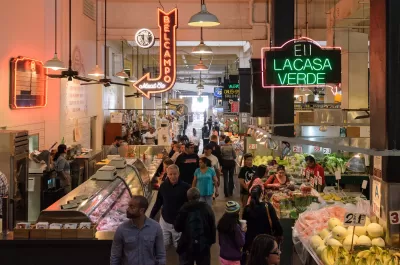The historic Grand Central Market has ridden the ups and downs of Downtown Los Angeles better than most retail locations, but can it retain its heart in the face of gentrification.

Opened in 1917, L.A.'s Grand Central Market located between the gleaming new towers of Bunker Hill and the historic downtown, has been an incubator for small grocers and retailers—mostly immigrants who came in waves to the United States during much of the 20th Century. Now, the gentrification of downtown Los Angeles is changing the market once again. As Jesse Katz reports in Los Angeles Magazine, the changes to the market have seen long time tenants replaced by more "upscale" food operations that cater to the wealthier and whiter clientele that have filled the new apartment and condos that have sprung up all over downtown.
The shorthand for everything happening at Grand Central is, of course, gentrification, a term whose meaning has been muddled and politicized. It can stand for dislocation, the loss of control that has piqued working-class communities of color across L.A., where moneyed interests have been pressuring rents and disrupting folkways. It can also stand for the regeneration of communities that have suffered isolation and neglect, undoing white flight, making them more diverse, not less. Befitting a city built largely by people from somewhere else, both versions on occasion happen in the same place, at the same time.
As the market's tenants and ownership has changed, uncertainty remains. Several lawsuits against the market's current owner allege that long time tenant were kicked out in favor of Caucasian operators.The Grand Central Market, as Katz writes, remains on either the cusp of bankruptcy or losing it's historic attachment to the immigrant communities that have operated the market's stalls for nearly 100 years.
FULL STORY: Inside the Gentrification of Grand Central Market

Maui's Vacation Rental Debate Turns Ugly
Verbal attacks, misinformation campaigns and fistfights plague a high-stakes debate to convert thousands of vacation rentals into long-term housing.

Planetizen Federal Action Tracker
A weekly monitor of how Trump’s orders and actions are impacting planners and planning in America.

In Urban Planning, AI Prompting Could be the New Design Thinking
Creativity has long been key to great urban design. What if we see AI as our new creative partner?

King County Supportive Housing Program Offers Hope for Unhoused Residents
The county is taking a ‘Housing First’ approach that prioritizes getting people into housing, then offering wraparound supportive services.

Researchers Use AI to Get Clearer Picture of US Housing
Analysts are using artificial intelligence to supercharge their research by allowing them to comb through data faster. Though these AI tools can be error prone, they save time and housing researchers are optimistic about the future.

Making Shared Micromobility More Inclusive
Cities and shared mobility system operators can do more to include people with disabilities in planning and operations, per a new report.
Urban Design for Planners 1: Software Tools
This six-course series explores essential urban design concepts using open source software and equips planners with the tools they need to participate fully in the urban design process.
Planning for Universal Design
Learn the tools for implementing Universal Design in planning regulations.
planning NEXT
Appalachian Highlands Housing Partners
Mpact (founded as Rail~Volution)
City of Camden Redevelopment Agency
City of Astoria
City of Portland
City of Laramie





























